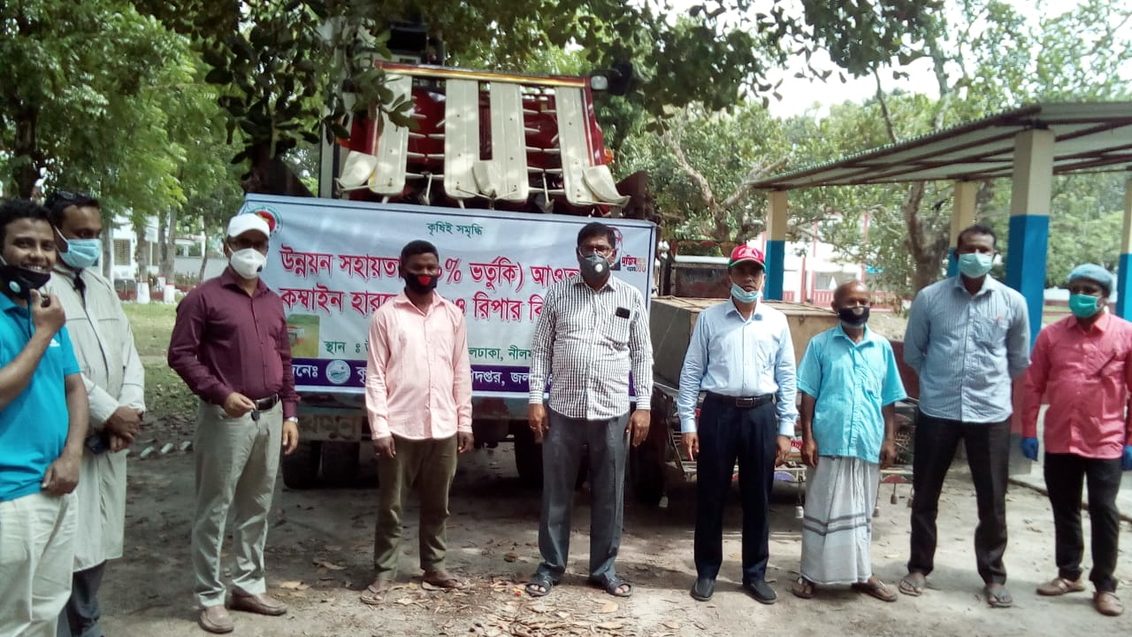Fresh produce, floods and video calls

Continuing our series on COVID-19 responses, we move to Bangladesh. Our team there has also had to move fast to tackle other challenges. We asked Country Director Farhad Zamil to bring us up to date.
syngentafoundation.org: What have you concentrated on in order to help smallholders directly?
Farhad Zamil: One key need is to keep fresh produce supplies flowing, while also ensuring that farmers continue earning fair income. The normal supply chains are seriously disrupted. So, for example, we’ve helped one of our Network Managers set up a “Farm to Fork” home delivery service. Farmers get the retail price of their produce and urban customers enjoy fresh vegetables. The Farmers’ Hub (FH) owners and delivery people just added a minimum service charge for the consumers. The FH is also promoting their seedlings to farmers ‘virtually’ and working out alternative delivery routes through people who are anyway still active in the field. Those include commercial representatives and local agricultural officers. We’re also helping farmers to continue supplying produce for which they have fixed contracts with buyers.
You mention agricultural officers. In what other ways have you linked up with government agencies?
The Haor region in north-eastern Bangladesh is a food basket for the whole country. It produces about 20% of the total rice supply. When we heard that flash flooding could seriously damage the boro rice crop there, we joined hands with the Department of Agricultural Extension. Our goal was to harvest the rice as fast as possible. With the pandemic causing a critical labor shortage, we quickly sent four of the FHs’ five combine harvesters to do the job. Each harvester generates an average of $6000 value in just 15 days’ operation.
What about teaming up with other partners?
For example, we worked closely with our local insurance partners, Green Delta Insurance Company Limited (GDIC). Our aim was to get farmers’ claims settled extra-fast and to direct the insurance company’s CSR donation towards emergency support. GDIC along with Nagad (mobile finance) has taken a joint emergency response initiative called “Amra Korbo Joy”. We’ve brought in our insured farmers and vulnerable smallholders connected with certain FH. We have also applied to the Swiss Development Corporation for additional support that would provide insured smallholders with sanitizing equipment and much-needed agricultural inputs.
How far have you had to revise and redesign Foundation activities?
We believe that it is crucial to maintain our program, operations and support to smallholders. That will help them ensure food production today and lay the basis for longer-term recovery. Maintaining our activities requires flexibility in implementation and timing. But we are also designing a program to provide rural jobs for the many women currently unable to work in urban garment factories. We are also planning an innovative recovery scheme that will kick in when the main pandemic threat has passed.
What particular challenges have come now that Ramadan has started?
Bangladesh is 90% Muslim. Ramadan is the main month for practicing spirituality, and when it ends, Eid-Ul-Fitr is the most joyful festival. But Ramadan with COVID-19 is very different. Government rules for physical distancing include not having more than twelve people praying together in a mosque. That has created some religious frustration. Alongside that, Eid is normally worth about $2.35 billion in business. Lots of formal and informal laborers benefit, as well as companies of all sizes. This year, that business is massively hampered by lockdown rules. That means a major additional economic challenge.
With all the concentration on smallholders, what about your own team’s well-being?
Mental well-being is a key issue, for farmers, partners’ teams, and our own employees. One of my main focuses is to keep everybody connected and motivating each other. SFSA Bangladesh was quick to set up an Emergency Management Committee to help with connections and guidance. We have lots of calls and video conferences in large and small teams, both internally, and with partners, Network Managers, Farmers’ Hub owners, and farmers. As well as providing agronomic advice, and helping ensure government permission for business operations, we also keep updated on the personal side.
Read how our teams in Indonesia, India, and Kenya are tackling the crisis:
